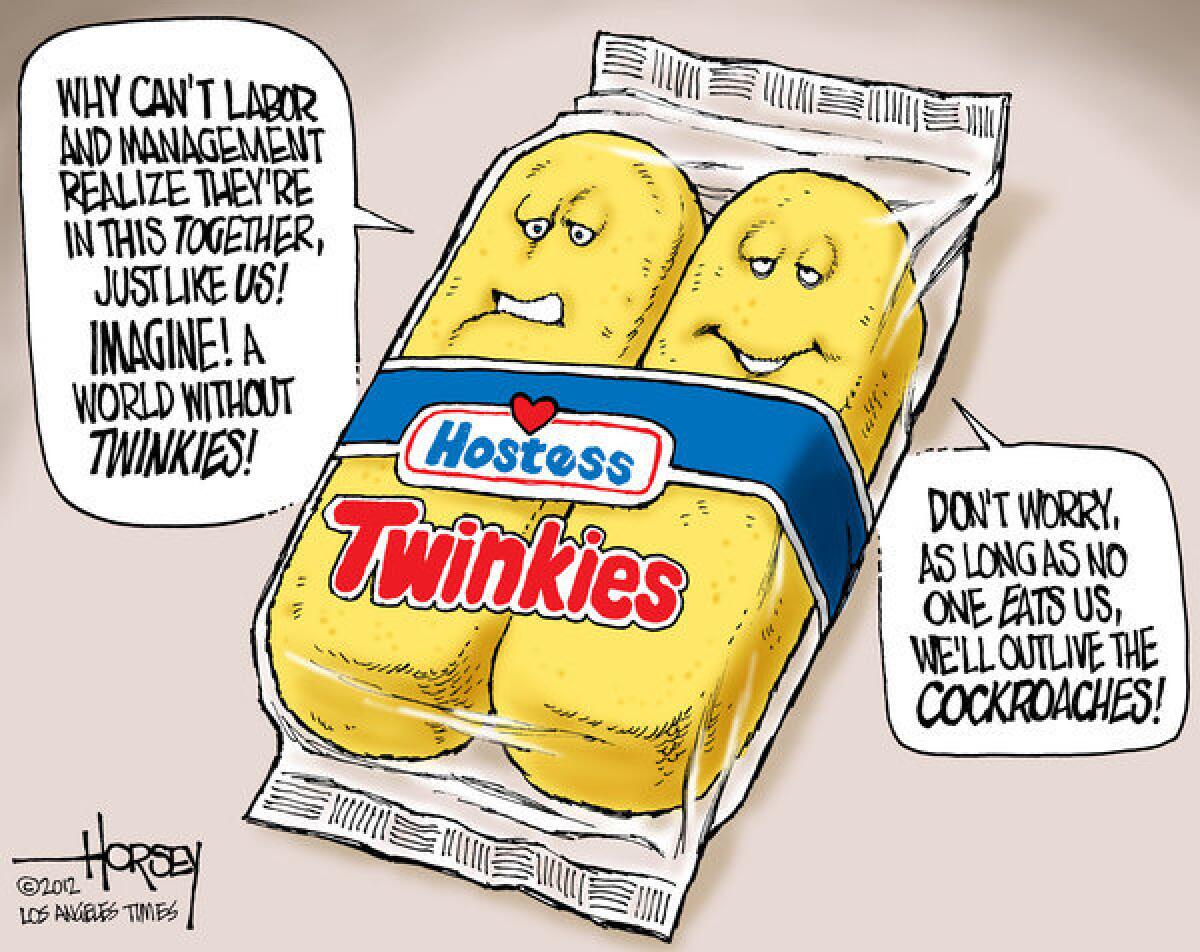Twinkies’ demise proves the stupidity of U.S. labor relations

The Great American Twinkie Crisis illuminates what is wrong with the relationship between management and labor in this country. Hostess, the company that since the 1930s has provided our nation with snacks that are nearly indestructible, now threatens to go out of business and leave us bereft of Ding Dongs, Sno Balls, Ho Ho’s, CupCakes, Wonder Bread and a variety of other baked goods that are probably not good for us but, at least to a kid’s palate, taste so good.
The company blames a nationwide strike by the Bakery, Confectionery, Tobacco Workers and Grain Millers International Union for the imminent death of its brand. In response, the workers say management has failed to innovate -- the company’s products have not changed in decades or adapted to new tastes and new concerns about nutrition and so have failed to keep pace with the market.
A bankruptcy judge briefly kept hope alive for fans of the sugary guilty pleasures by urging the bakers and the bosses to try to work out a resolution through private mediation that might have kept the Twinkies rolling out of the ovens (or wherever they come from). Sadly, the latest reports are that the mediation broke down and that the company will proceed with liquidation. That means 18,500 people will lose their jobs.
PHOTOS: Top of the Ticket cartoons
Two questions come to mind. First, did the workers understand how close to ruin the company was when they decided to go on strike? Second, did the owners bother to listen to employees’ concerns about improving the product line or did they just let the brand drift into financial crisis?
And here’s a third question: When will employers and workers stop acting like adversaries and learn that they are on the same side?
I am reminded of a newspaper strike I was drawn into back in 2000. Two newspapers were involved. At mine, there were really no serious issues that could not be worked out, but, because the two newspapers negotiated together, we got drafted into the picket lines along with everyone else. The newspaper industry was already starting to falter back then, so, in retrospect, the strike was even more self-destructive than it seemed at the time. But stubbornness prevailed on both sides and the strike dragged on for weeks.
Ultimately, a settlement was reached, but, within a few years, my newspaper had stopped print publication and the other one struggles on with very uncertain prospects. The strike did not cause the troubles, but it certainly did not help. The modest gains that were made were ephemeral.
I am not at all anti-union. In fact, I believe the fading of labor power has contributed to the stagnation of middle-class incomes over the last 30 years. Far too many American workers now stand alone, forced to accept pay cuts, longer hours, reduced benefits and arrogant disregard from their employers. But strikes are a blunt instrument, a club used to hammer insensitive bosses until they cry uncle. In the 21st century, it seems as though there should be a better way.
How about this? In any larger company, give employees as big a voice as investors. Give them a place at the table -- the table in the boardroom. Do not treat them as faceless cogs in a machine, treat them as what they are: the essential people who make the product or provide the service and who have good ideas of their own. Spread the rewards of success beyond the CEOs and stockholders. Workers should not have to strike to be given a fair share of company profits; they should have a real stake and a real voice in the success or failure of a company.
I will bet there was a way for Hostess to organize itself that would have brought employees into the process of saving the company. Instead, management and labor went to war and everyone lost.
More to Read
A cure for the common opinion
Get thought-provoking perspectives with our weekly newsletter.
You may occasionally receive promotional content from the Los Angeles Times.







